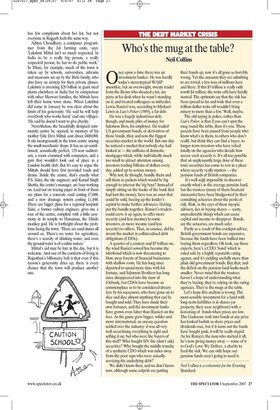Who's the mug at the table?
Neil Collins nce upon a time there was an investment banker. He was hardly today's stereotypical WASP smoothie, but an overweight, sweaty trader from the Bronx who shouted a lot, ate pizza at his desk when he wasn't standing on it, and treated colleagues as imbeciles. Lewie Ranieri was, according to Michael Lewis in Liar's Poker (1989), a fat slob. He was a hugely industrious slob, though, and made piles of money for Salomon Bros, his employer. He traded US government bonds, or derivatives of those bonds, then and now the biggest securities market in the world. But one day he noticed a market that nobody else had looked at — the millions of domestic mortgages which, while individually much too small to attract attention among investors trading billions of dollars every day, added up to serious money.
Why not, he thought, bundle them and sell them in packets which would be big enough to interest the big boys? Instead of simply sitting on the books of the bank that had lent the money, here was an asset that could be sold, freeing up the lender's capital to make further advances. Having put the bundle together, Ranieri's traders could carve it up again, to offer more security (and less income) to some investors, or more income (and less security) to others. Thus, in essence, did he invent the market in collateralised debt obligations (CD05).
A quarter of a century and $5 trillion on, the wind Ranieri sowed has become the whirlwind which is now threatening to blow away forests of financial businesses with shallow roots. He has long since departed to spend more time with his fortune, and Salomon Brothers has long since disappeared into the maw of Citibank, but CDOs have become so commonplace as to be considered dreary fare by his successors, who have gone on to slice and dice almost anything that can be bought and sold. They have made their own fortunes, and the investment banks have grown even fatter than Ranieri on the fees. As the game grew bigger, wilder and more international, an uneasy question settled over the industry: it was all very well securitising everything in sight and selling it on, but who were the buyers of this stuff? Who bought SIV-lite (don't ask) securities? Who bought the middle tranche of a synthetic CDO which was miles away from the poor saps who were actually servicing the underlying debt?
We didn't know then, and we don't know now, although some culprits are putting their hands up, now it's all gone so horribly wrong. Yet the amounts they are admitting to are trivial; a few tens of millions here and there. If this $5 trillion is really only worth $4 trillion, the write-offs have hardly started. The optimists say that the risk has been spread so far and wide that even a trillion-dollar write-off wouldn't bring misery to more than a few. Well, maybe.
The old saying in poker, rather than Liar's Poker, is that if you can't spot the mug round the table, then it's you. These parcels have been passed from people who know what's in them, to others who don't really, but think they can find a buyer, to longer-term investors who have relied totally on the agencies who decide how secure each security is. It's all too possible that an unpleasantly large dose of these toxic securities has come to rest in a place where security really matters — the pension funds of British companies.
It's well-nigh impossible to discover exactly what's in the average pension fund, but the trustees (many of them financial innocents) have been bludgeoned by their consulting actuaries about the perils of risk. Risk, in the eyes of these myopic advisers, lies in buying shares — nasty, unpredictable things which can cause capital and income to disappear. Bonds, say the actuaries, are much safer.
Partly as a result of this crackpot advice, British government bonds are expensive, because the funds have been bullied into buying them regardless. Oh look, say these experts, here's a CDO 'bond' which is rated safe by a highly reputable rating agency, and it's yielding usefully more than plain old government bonds. Buy that, and the deficit on the pension fund looks much smaller. Never mind that the trustees haven't a hope of understanding what they're buying: they're relying on the rating agencies. They're the mugs at the table.
Let's hope this analysis is wrong. The most sensible investment for a fund with long-term liabilities is in shares (or property, their near neighbour) with a leavening of bonds when prices are low. The Gadarene rush into bonds at any price has looked foolish as share prices and dividends rose, but if it turns out the funds have bought junk, it will be really stupid. As for Ranieri, the man who started it all, he's now giving money away — some of it to God's Love We Deliver, a charity to feed the sick. We can only hope our pension funds aren't going to need it.
Neil Collins is a columnist for the Evening Standard.



































































 Previous page
Previous page